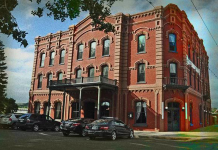Originally published by Eric Ruben — February 12, 2024
I can prove to you in one word that the alleged “Pro-Palestinian” protests worldwide are:
At best, anti-Israel based on ignorance;
At worst, wildly antisemitic and/or hatefully anti-Israel; and
The one thing they are NOT is “pro-Palestinian.”
That word?
Yarmouk.
Yarmouk was, only 12 years ago, the Syrian city with the world’s largest Palestinian community. At least 160,000 Palestinians lived there.
Once Syrian dictator and butcher Bashar al-Assad got his grimy hands on Yarmouk, it wasn’t long before journalists were calling the city “the worst place on earth.”
Why? Several reasons; and I’ll tell you those reasons along with the world’s reaction to them. Then, you decide what that means.
On Dec 16, 2012, the Syrian air force bombed Yarmouk killing at least “dozens” of civilians (the real number may never be known). The streets of NewYork, LosAngeles, Chicago, Toronto, London, Paris, Rome, Dublin, etc.? All quiet.
Tens of thousands of Palestinians fled Yarmouk and were displaced without anywhere to go and without knowing if/when they may ever return.
For the Palestinians who stayed in Yarmouk, they could not possibly have imagined the dystopian hellscape that awaited them over the next six+ years.
First, Assad enforced a brutal and complete one-year-long siege on Yarmouk. He then continued that siege, only with a few exceptions, for another 5-6 years after that.
Were the streets of the world filled with protestors?
No.
There was no electricity in Yarmouk for a year, and very little electrictiy for the next five years.
No protests.
There was no piped water whatsoever in Yarmouk for a year, and very little drinkable water for the next five years.
No protests.
There was no access to or very minimal access to any food for a year and very little food for the next five years.
No protests.
Medical supplies were next to zero, as Assad did not want to risk them ending up in the hands of opposition fighters hiding in Yarmouk – Palestinian civilians be damned.
Even worse – after the initial fleeing of tens of thousands, the remaining Palestinians of Yarmouk were not allowed to leave the city – Assad made them stay there.
So, in the largest Palestinian city in Syria, Palestinian civilians were indiscriminately slaughtered, tens of thousands fled, and then Assad laid total siege to the remaining tens of thousands of Palestinians during which men, women, children, the elderly, the infirm, and babies were all forced to stay in Yarmouk without electricity, without water, with minimal access to food, and with little to no access to any medication or first aid of any kind.
And there were no protests.
The number of Palestinians who died of malnutrition and the number of Palestinian women and their babies who died in childbirth during the siege is unknown to this day.
There was no worldwide outcry.
There was no push for real numbers of the dead and the suffering.
There were no protests.
There was near total silence.
Much has been made about the humanitarian corridors and humanitarian aide that Israel has allowed to flow into Gaza despite Hamas terrorists using the corridors to escape, and despite well over 50% of that aide being stolen by Hamas.
Well, in Syria, Assad refused to provide a humanitarian corridor; and he refused to allow humanitarian relief into Yarmouk.
The streets of the world?
Silent.
One Palestinian woman in Yarmouk described the scene:
“You couldn’t buy bread. At the worst point a kilo of rice cost 12,000 Syrian pounds (£41), now it is 800 pounds (£2.75) compared to 100 Syrian pounds (34p) in central Damascus. It was 900 pounds (£3.10) for a kilo of tomatoes … we used to eat wild plants. We picked and cooked them. In every family there was hepatitis because of a lack of sugar. The water was dirty. People had fevers. Your joints and bones felt stiff. My middle daughter had brucellosis and there was no medication.”
Silence. Deafening silence.
So many Palestinians in Yarmouk were dying from malnutrition that Yarmouk’s largest mosque gave a religious decree (fatwa) that permitted the consumption of dogs, cats, and donkeys.
Shocking silence.
In 2014, testing on a random sample of Palestinians in Yarmouk showed 40% had typhoid.
Silence.
All 28 of Yarmouk’s schools were shuttered.
Silence.
Even after the initial total siege ended, the water supply was not restored. The city’s water pipes were damaged in fighting in September 2014 – leading to four more years during which Yarmouk’s Palestinians had to drink untreated groundwater.
Where were the protestors?
During and after the complete siege, Assad began a campaign of particularly heavy indiscriminate bombing of Yarmouk that saw civilians, including children on playgrounds, blown up. How many? We can say “thousands,” but we will probably never know how many for sure.
The world? Silent.
A UN official anonymously admitted about Yarmouk, “Conditions are far worse than Gaza … Palestinians always had dignity, hope, resilience. Now after four years of war I see people giving up. They find it hard to accept there are no options.”
Even the virulently anti-Israel commentator, Mehdi Hasan, who recently lost his job for being too viciously anti-Israel even for MSNBC admitted in April of 2015:
“Let’s be honest: how different, how vocal and passionate, would our reaction be if the people besieging Yarmouk were wearing the uniforms of the IDF?”
By that point in time, Yarmouk was widely called the city with the “worst humanitarian crisis” since World War II.
But the streets of the world were not filled with protestors. There was barely a peep.
Meanwhile, many of the long-suffering Palestinians of Yarmouk started obtaining desperately needed medical assistance from what many may consider an unlikely source: Israel.
Starting in June 2016, the IDF launched “Operation Good Neighbor” to help civilians in Syria.
At first, Syrians who could make it across the border were transported to Israeli hospitals, and later Israel opened a field hospital close to the border since so many civilians started seeking Israel’s help.
One Palestinian from Yarmouk feared enough for her son’s life to seek help from “enemy” doctors in Israel. When her son was treated with care and humanity and nursed back to health, she told journalists, anonymously for her own safety back home, “I used to see Israel as an occupying power, but not anymore. My whole opinion of Israel has changed.”
In total, Israel treated at least between 5,000-10,000 wounded and often starving civilians who crossed the border from Syria.
Israel even started a donation drive and collected supplies like toys, crayons, games, and candies for suffering children; and Israel got those donations across the border quietly, along with government-donated dire necessities like food, fuel, clothing, and baby care.
How many stood up to praise Israel for its humanity?
Very, very few. And outside the Jewish world, almost none.
The worst of the dire situation in Yarmouk went on for more than six years.
In April of 2018, Yarmouk was being bombed twice every 90 seconds. By the end of that month, Al Jazeera estimated at least 60% of Yarmouk had been completely destroyed and an unknown number of Palestinian families were trapped under the rubble.
By May of 2018, journalists simplified it: “Yarmouk is gone”.
How many pro-Palestinian protests in how many cities do you recall in April and May of 2018?
How many protests do you recall for the entirety of those six years from 2012-2018?
Sadly, for those innocent Palestinian civilians who lived under the yoke of dictatorship – whether Assad or Hamas – their outrageously inhumane plight was almost entirely ignored by a disinterested world.
Yet, how many streets of how many cities across the world were already filled with protestors during the first days and weeks after the Hamas October7 Massacre of more than 1,200 Israelis?
The streets worldwide were filled even before Israel had begun its counter-offensive to rescue the more than 240 hostages taken by Hamas and to bring Hamas terrorists to justice and forever end Hamas’ ability to make war on Israel.
What more evidence could anyone need?
The worldwide protests are all about being anti-Israel and/or antisemitic.
They certainly are not about saving any Palestinians.
Sadly, when the Palestinians have needed the world to save them from other Arabs, nobody marched.
Only when Jews are involved – that’s when the venom, the hate, the motivation, and the organization to protest and intimidate comes out.
Several responses showed interest in “Operation Good Neighbor” when Israel aided injured/starving Syrians, including Palestinians.
Conan O’Brien did a show in Israel in 2018 and visited injured Syrians being treated by Israeli doctors (clip below).

sourced – Eric Ruben aka Captain Allen on X, is a lawyer and historian of Jewish and Israeli history.
Listen to the Jewish and Israeli history. An intro to the conflict Podcast







[…] do nothing to help the Palestinians. Don’t believe me? … just take a good long look at what Syria did to the Palestinians not so long ago. Instead of showing presumed intelligence with regard to the Palestinian plight, […]